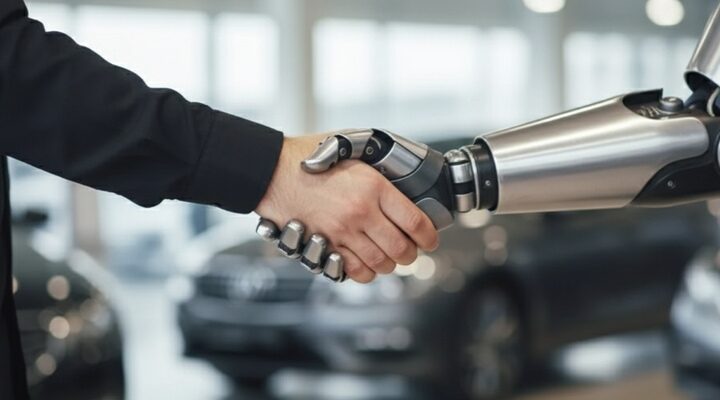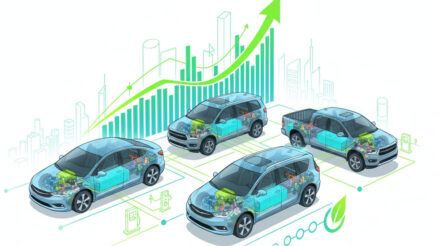We are on the verge of a revolutionary phase in the auto industry, driven by Artificial Intelligence (AI). You have likely already noticed the clues to the revolution. In this space, the flow of work has become smoother, the inventory smarter, and the customer may even be more personal. AI is no more a buzzword, but a tool that dealerships and manufacturers cannot ignore.
In this guide, we will show you exactly how AI is reshaping the automotive service industry. Whether it’s predicting maintenance needs before they become a headache or hyper-personalizing the customer journey to keep them coming back, AI is proving to be a vital force for growth and customer loyalty. So, grab a coffee (or matcha)—let’s explore what’s driving this big shift.
The Current State of AI in Automotive Service
Initial focus on AI integration was based on basic vehicle functions. These applications featured crucial vehicle safety measures and the use of semi-autonomous driving capability. That same tech created the requisite base of large-scale data gathering and vehicle connectivity.
Since then, AI applications have grown greatly beyond the actual vehicle. Car dealerships now are using AI extensively in their sales processes and customer outreach strategy. Virtual assistants powered by AI can perform various tasks effectively, such as qualifying leads, responding to frequent queries, and making appointments. It automates and simplifies the early customer journey stages, making them faster and more consistent.
In fact, according to Webster (n.d.), 44% of automotive businesses are currently using AI. Which means, there’s a strong interest in digital innovations. It also translates to how AI is transforming the way vehicles are designed, manufactured, and even driven. One thing to note is that such transition to software-defined vehicles requires advanced AI systems for continuous management, over-the-air updates, and optimized internal architectures.
Key Benefits of AI in Automotive Service
Integrating AI delivers measurable, quantifiable benefits directly impacting the service drive and the business bottom line.
1. Faster Response Times
AI fits the modern customer expectations perfectly. Customers of today want 24/7 instant communications. AI virtual assistants can provide instant answers across major communication channels such as chat, email, and voice. Such assistants can respond to specific questions about car models, prices, and service availability in real time. No frustrating delays at all.
These efficiency gains are proven by quantitative outcomes. Switching to more advanced machine learning systems was shown to reduce the time required to complete a survey to 4 minutes per survey. That small optimization would save 5,906 hours in a whole cumulative time. [see full study here]
2. Cost Efficiency
The cost of operations is drastically lowered as AI eliminates the necessity of huge human customer support teams. Routine administrative tasks including lead follow-up and appointment reminders, are automatically handled by AI agents.
Another key financial benefit of AI is customer retention. Research shows that acquiring a new customer is far more costly—five times as costly as retaining one. AI helps dealerships by cleaning and activating useful data that are stored in Dealer Management Systems (DMS). It recognizes and finds dormant or lost customers to engage back.
3. One-on-One Customer Relationships
AI systems use detailed customer information, such as previous interactions, individual purchase history, and vehicle tastes. This data can be used to provide personalized, targeted service recommendations.
One application of this personalized approach is predictive maintenance. AI tracks vehicle performance using telematics data installed in the vehicle. Such feature allows service centers to propose certain service packages depending on the actual driving habits of a particular customer. Amazing, isn’t it?
It’s the level of anticipatory service that builds profound, long-term loyalty. The technological shift toward machine learning improved predictive accuracy and overall efficiency. The result? Individual customer service visit rates increased by 30%, and corporate customer visits rose by 37%. [see full study here]
4. Improved Scalability
AI solutions can guarantee high-quality, consistent service at any business size. AI platforms are built to scale easily from a single local dealership operation to a massive national network. This ensures consistency in service delivery and customer experience. Things that are vital for profitable business growth.
Future Innovations in AI-Driven Auto Customer Service
The next wave of AI innovations revolves around profound personalization and physical support of technicians and customers.
⦿ Hyper-Personalized Experiences
AI systems are going beyond mere personalization to hyper-personalization through predictive AI-driven analytics. This next-generation forecasting enables very optimized repair services and proactive customer engagement.
GenAI (generative AI) is also changing conventional support documentation. GenAI can substitute the old-fashioned documentation that takes time. Rather than picking up a huge 200-page car manual, an AI assistant will cross-check instant car, real-time diagnostics. It then immediately gives a comprehensive description of the problem and a brief outline of possible solutions. Minimizing vehicle breakdowns = increases customer satisfaction.
⦿ Multilingual AI Agents
Multilingual AI agents are becoming essential for serving diverse customer groups. These intelligent agents leverage language detection and extensive contextual knowledge. They can conduct real-time and natural conversations in a variety of languages. Such tech potential enables car companies to overcome language barriers and offer real global support without expanding their human resources.
⦿ Augmented Reality (AR) Support
Augmented Reality (AR) is changing the customer knowledge and technician repair process. AR helps customers have a better understanding, as it provides an interactive walkthrough of the vehicles (virtual).
For service teams, AR provides essential, real-time support. AR provides visual instructions and is directly overlaid on the vehicle in complicated repairs. This AR-based repair assistance increases its efficiency and accuracy. Through specifying contextual work instructions, AR enables service technicians to quickly diagnose the issue and perform the repair the first time. That results in increased first-time fix rate (FTFR), reduced expensive rework and waste.
⦿ White Glove Concierge Service Experience
AI is what’s behind the “white-glove, wow-worthy experiences” that convert casual browsers into revenue-driving regulars. This concierge service [usually found on luxury brands] involves personalized communication, seamless scheduling, and proactive engagement across the entire ownership lifecycle. AI handles all routine administrative tasks, allowing human staff to dedicate their time to delivering high-impact, personal interactions.
Impact on Customer Loyalty and Revenue Growth
AI creates a direct and quantifiable connection between excellent service quality and long-term financial results.
AI helps to increase customer satisfaction by providing them with proactive communications and serving them individually. Customer trust and brand loyalty thrive when services are exactly what they want and when they need them. Greater after-sales interactions, through predictive maintenance notifications, will surely help dealerships retain purchasers across the lifetime of vehicles. Always give a consistent, quality, customized customer experience.
The industry is already validating these positive financial outcomes. A 2024 CDK study, AI in Automotive, confirms this trend, with 68% of AI-powered dealerships reporting positive operational impacts. Those dealerships that actively capitalize on AI will be better positioned to grow efficiently and even make more profits than the more traditional ones.
Success Stories in Automotive AI Service Enhancements
Leading manufacturers provide strong case studies showing how AI is transforming service relationships to meet new, high customer expectations across the industry.
➜ Tesla Autopilot Case Study: The Autopilot system is a Tesla advanced AI that interprets real-time data collected by vehicle sensors and cameras. This constant, high-fidelity data flow provides immediate diagnostics relevant to safety features. Such capability alters traditional service routines by enabling rapid issue identification and facilitating over-the-air updates.
➜ BMW Intelligent Personal Assistant: The BMW Intelligent Personal Assistant enables the driver to connect with many car functions, including climate and navigation systems, via voice commands. It offers a smooth hands-free experience. Moreover, the system records interaction data, which is valuable for workflow automation of in-car installation and service troubleshooting.
➜ Toyota’s “Yui” AI System: Toyota’s “Yui” AI system represents the pinnacle of current personalization. Yui is responsive to the feelings, actions, and tastes of a driver. By providing an incredibly personalized and user-friendly in-car experience, Yui sets the ultimate standard for anticipatory service that customers will come to expect from their car service providers.
Strategic Move for Dealerships Adopting AI
The integration of AI needs a four-part strategy checklist to succeed.
1️⃣ Assess Digital Readiness
Start by evaluating your current digital infrastructure and defining specific objectives — whether to boost operational efficiency or elevate customer satisfaction.
2️⃣ Identify Automation Opportunities
Conduct a focused audit to uncover repetitive tasks and problem areas that can be optimized or automated through AI solutions.
3️⃣ Collaborate with AI Experts
Partner with specialized AI solution providers or consultants to develop a tailored strategy that fits the automotive industry’s unique needs.
4️⃣ Empower and Train Teams
Ensure your workforce receives comprehensive training and upskilling programs so employees can confidently adapt and maximize the benefits of new AI systems.
Conclusion
Indeed, AI and digital tools are radically changing the experience of automotive services, shifting it from reactive to proactive. It’s undoubtedly necessary to integrate AI now across the customer lifecycle, in both sales and service. All the data and studies speak for themselves. The connection between such AI-powered service and long-term customer retention is hard to deny.
Companies that embrace AI will not only boost operational efficiency and revenue, but also drive innovation. They will build a stronger, more trusting relationship with their customers. Thus, we can expect the AI to further redefine service lanes, making them the new competitive battleground in the future of mobility.
—
Author: Maverick Steel is a writer and digital marketer who enjoys connecting the dots for strategy and engaging content. He spent 6 years in secondary education as a proud campus journalist, specializing in editorial and column writing. Holding a bachelor’s degree in Marketing Management, Maverick is also a devoted advocate for positive cyber citizenship and a certified pet lover. When he’s not busy writing, you can catch him hitting the gym or enjoying a matcha latte at the nearest aesthetic coffee shop.





